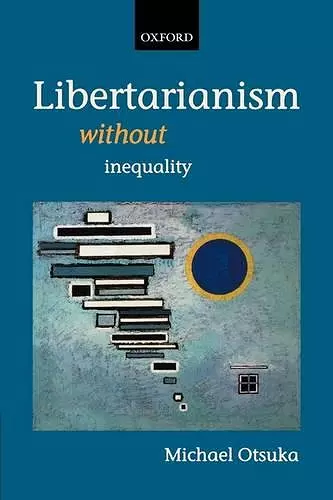Libertarianism without Inequality
Format:Paperback
Publisher:Oxford University Press
Published:16th Jun '05
Currently unavailable, and unfortunately no date known when it will be back

Michael Otsuka sets out to vindicate left-libertarianism, a political philosophy which combines stringent rights of control over one's own mind, body, and life with egalitarian rights of ownership of the world. Otsuka reclaims the ideas of John Locke from the libertarian Right, and shows how his Second Treatise of Government provides the theoretical foundations for a left-libertarianism which is both more libertarian and more egalitarian than the Kantian liberal theories of John Rawls and Thomas Nagel. Otsuka's libertarianism is founded on a right of self-ownership. Here he is at one with 'right-wing' libertarians, such as Robert Nozick, in endorsing the highly anti-paternalistic and anti-moralistic implications of this right. But he parts company with these libertarians in so far as he argues that such a right is compatible with a fully egalitarian principle of equal opportunity for welfare. In embracing this principle, his own version of left-libertarianism is more strongly egalitarian than others which are currently well known. Otsuka argues that an account of legitimate political authority based upon the free consent of each is strengthened by the adoption of such an egalitarian principle. He defends a pluralistic, decentralized ideal of political society as a confederation of voluntary associations. Part I of Libertarianism without Inequality concerns the natural rights of property in oneself and the world. Part II considers the natural rights of punishment and self-defence that form the basis for the government's authority to legislate and punish. Part III explores the nature and limits of the powers of governments which are created by the consensual transfer of the natural rights of the governed. Libertarianism without Inequality is a book which everyone interested in political theory should read.
This is a challenging book. It demands that both liberals and economic liertarians re-examine their interpretations of the fundamental political values of freedom and equality. * Samuel Freeman MIND *
In this important contribution to rights theory, the deontology of punishment, and the problem of political obligation, Michael Otsuka argues against the belief, prevalent on both the left and the right of the political spectrum, that the fundamental principles of libertarianism conflict with the ideal of economic equality. This allows him to defend libertarianism without inequality a radical and provocative normative construction that is both more egalitarian and more libertarian than mainstream (left-of-centre) liberal egalitarianism. . . . Otsukas style is pithy, engaging, and crystal-clear. * Ian Carter, Notre Dame Philosophical Reviews *
Continued His theses are bold, imaginative, and defended with the utmost philosophical rigour. . . . In my view, the book represents one of the best recent contributions to normative political theory. . . . His book will no doubt give rise to a great deal more discussion, and it surely deserves to have a major impact on current debates on justice and political obligation * Ian Carter, Notre Dame Philosophical Reviews *
ISBN: 9780199280186
Dimensions: 233mm x 156mm x 10mm
Weight: 268g
170 pages